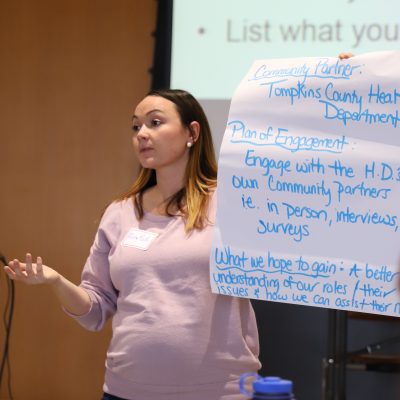Grad Students Prepare for Community-Engagement Experiences

Alicia Musk presents at the Engaged Graduate Student Institute. (Photo credit: Ashlee McGandy)
By Katya Hrichak
Revised 11/29/18
To help fulfill what Cornell President Martha E. Pollack describes as Cornell’s determination to serve the greater good through public engagement, the inaugural Engaged Graduate Student Institute brought students from programs across campus together Nov. 9 to learn how to conduct research while making a positive impact on the community.
The Engaged Cornell event on community-engaged learning and research had interactive sessions that focused on best practices in community partnership, critical reflection, how to include community voice in research, and standards of practice in community engagement.
“At its core, it’s about being involved, building relationships, collaborating with off-campus partners in some way to benefit the public good,” said Mike Bishop, director of student leadership in the Office of Engagement Initiatives, which organized the institute.
Master of Public Administration candidate Palina Gurung elaborated upon these ideas during the lunchtime panel, during which she spoke about her community engagement experience focused on tourism development in Popayán, Colombia.
By building a relationship with the local community, Gurung was able to offer an English-language workshop to street vendors to improve tourist-resident interactions, helping both the city and her research.
“I’ve always imagined doing research with a community rather than on a community,” said Master of Public Health candidate and panelist Andreina Martin. An equal partnership between researcher and local community was central to the experiences of each of the three panelists, Gurung, Martin and Master of Professional Studies candidate Ackson Joseph Mwanza.
Listening and learning how other students had successfully incorporated their research into engagement experiences was one of the reasons participants chose to attend the institute. Many were planning their own community engagement experiences.
“It’s always good to hear others’ perspectives, especially since I’m a newer researcher,” said Mame Ndiaye, an MPS student in global development. “What I have gained from [the institute] is that the best way to understand things is to talk to other people, so not necessarily going to them just to seek advice, but going to them to hear their experience and see how you can plug that back into your research.”
Emma Murrugarra, a doctoral student in human development, expressed similar goals upon registering for the event as well as similar takeaways.
“I wanted to learn more about how to get involved and find ways to apply my research in a way that actually benefits individuals other than ourselves within the academic community,” she said. “I enjoy the way that this program changes the way we think about what it means to do service. It’s not going in and doing service, it’s ways in which we receive and ways in which we learn and benefit.”
Students interested in conducting their own community-based research can email Amanda Wittman in the Office of Engagement Initiatives to find out more about resources and funding. Graduate School-sponsored Research Travel Grants are available for graduate students interested in research travel funding.
Katya Hrichak is a communications assistant in the Graduate School.
